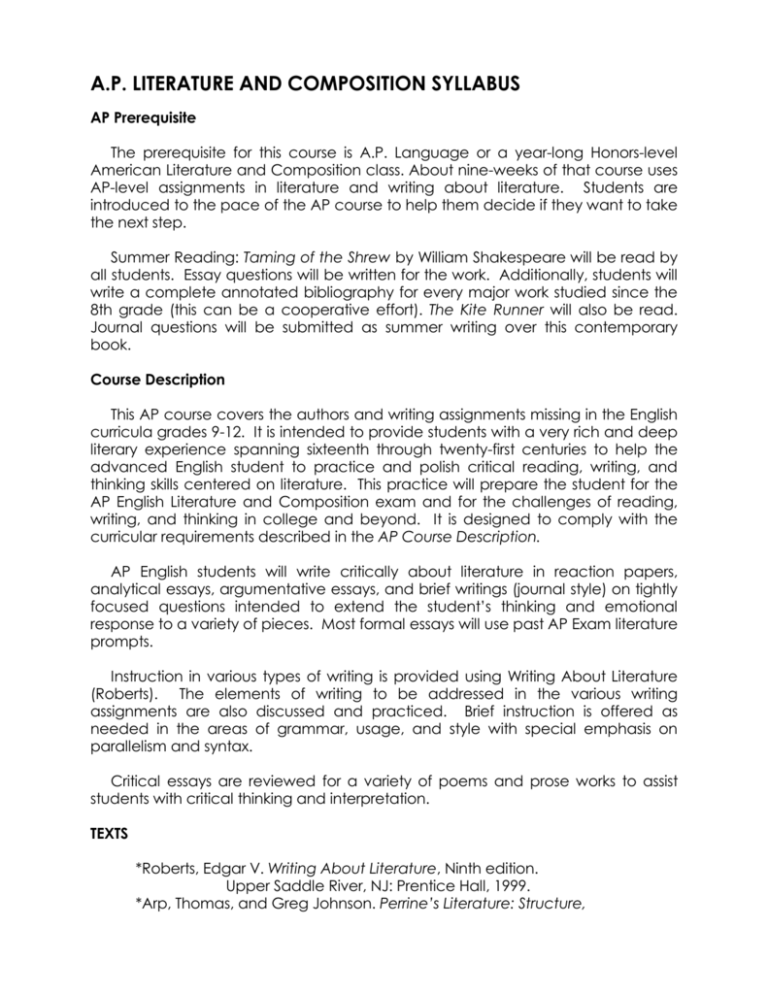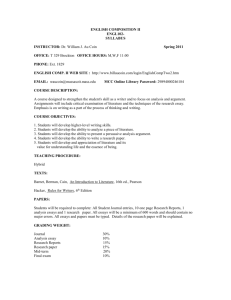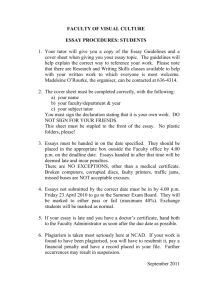Syllabus
advertisement

A.P. LITERATURE AND COMPOSITION SYLLABUS AP Prerequisite The prerequisite for this course is A.P. Language or a year-long Honors-level American Literature and Composition class. About nine-weeks of that course uses AP-level assignments in literature and writing about literature. Students are introduced to the pace of the AP course to help them decide if they want to take the next step. Summer Reading: Taming of the Shrew by William Shakespeare will be read by all students. Essay questions will be written for the work. Additionally, students will write a complete annotated bibliography for every major work studied since the 8th grade (this can be a cooperative effort). The Kite Runner will also be read. Journal questions will be submitted as summer writing over this contemporary book. Course Description This AP course covers the authors and writing assignments missing in the English curricula grades 9-12. It is intended to provide students with a very rich and deep literary experience spanning sixteenth through twenty-first centuries to help the advanced English student to practice and polish critical reading, writing, and thinking skills centered on literature. This practice will prepare the student for the AP English Literature and Composition exam and for the challenges of reading, writing, and thinking in college and beyond. It is designed to comply with the curricular requirements described in the AP Course Description. AP English students will write critically about literature in reaction papers, analytical essays, argumentative essays, and brief writings (journal style) on tightly focused questions intended to extend the student’s thinking and emotional response to a variety of pieces. Most formal essays will use past AP Exam literature prompts. Instruction in various types of writing is provided using Writing About Literature (Roberts). The elements of writing to be addressed in the various writing assignments are also discussed and practiced. Brief instruction is offered as needed in the areas of grammar, usage, and style with special emphasis on parallelism and syntax. Critical essays are reviewed for a variety of poems and prose works to assist students with critical thinking and interpretation. TEXTS *Roberts, Edgar V. Writing About Literature, Ninth edition. Upper Saddle River, NJ: Prentice Hall, 1999. *Arp, Thomas, and Greg Johnson. Perrine’s Literature: Structure, Sound, and Sense, Ninth edition. Boston, MA: Thomson Wadsworth, 2006. Bevilacqua, Mary, et al. Amsco’s AP Literature and Composition Preparing for the Advanced Placement Examination. New York: Amsco School Publications, 2002. Shostak, Jerome. Vocabulary Workshop, Level F. New York: SadlierOxford, 2005. * Primary texts Evaluation of writing – approximately 50-60% of the quarter grade, depending on the other assignments in that quarter Essays with well-developed, logical organization; clear, coherent, and persuasive language; a thesis statement well-supported with textual details or quotes; and attention to mechanics, usage, grammar, parallelism, and spelling is the goal of all writing. Each first quarter essay will be graded using a rubric that focuses heavily on the one or two elements of writing reviewed in instruction for that assignment. Each essay in the second through fourth quarters will be graded based on the AP rubric provided for it or one that has been adapted from previous AP rubrics. Rewrites of portions of the essay or of the entire essay will be offered as needed. This may be a whole class assignment or an individual assignment. Presentations/Projects – 20-30% of the overall quarter grade based on the scope on the assignment. Other Evaluations Portions of the multiple choice sections of past AP exams and multiple choice questions from Amsco’s guide will be used and graded. Quizzes over reading selections and vocabulary, brief writing assignments (about 5-10 minutes each), and written homework will also make up the balance of the points for the quarter. SYLLABUS I add or subtract from this syllabus as the year progresses. The number of students in the class, the date of the AP Exam, the number of class interruption, and the number of calamity days all impact the schedule. First Quarter 7-9 formal essays to be written Discuss summer assignments: Kite Runner and Taming and the essays about the play tone Unit on Tone: poetry, prose, composition Understanding tone, identifying tone and tonal shifts, creating a word bank, writing about the tone in selected short stories and poetry Short Fiction unit in Perrine and supplements to include “A Child by Tiger,” T. Wolfe; “Everyday Use,” Alice Walker; “The Lesson,” Toni Cade Bambara; “Hills Like White Elephants,” Ernest Hemingway; “The Rockinghorse Winner,” D. H. Lawrence and “A Rocking-Horse: The Symbol, the Pattern, the Way to Live” by W. D. Snodgrass; “The Guest,” Albert Camus; “Metamorphosis,” Franz Kafka; and “The Death of Ivan Ilych,” Leo Tolstoy Essay writing with focus on point of view, theme, setting, irony, characterization, and symbolism. Writing About Literature is used throughout this unit with students reading the model essays and evaluations then writing their own essays. Formal timed essays use past AP Literature and Composition exam prompts. Brief writing assignments will be small, focused questions to begin critical thinking prior to class discussion. The following group essay is assigned with Hemingway’s “Hills Like White Elephants.” In a well-organized essay explain how Hemingway reveals the identity of the “operation” to the reader. Consider various elements of fiction; such as, symbolism, setting, imagery, characterization, diction, or any other aspects of the narrative artist’s craft. Short Story analysis project: read The Dubliners by James Joyce; Assignment: pairs of students will explicate one of the works for an in-class presentation. Turn in notes and bibliography. All groups must include a discussion of the epiphany and the paralysis theme. Introduction to poetry to include selections from Perrine and supplements by Alfred, Lord Tennyson, William Shakespeare, Wilfred Owen, Robert Hayden, Dudley Randall, Gwendolyn Brooks, A. E. Housman, Archibald MacLeish, Thomas Hardy, Emily Dickinson, Sylvia Plath, William Blake, Ellen Kay, Henry Reed, William Wordsworth, Robert Frost, John Donne, And Elizabeth Bishop Vocabulary: Poetry terms and lessons from Vocabulary Workshop Second Quarter 5-7 formal essays to be written Madame Bovary, Gustave Flaubert This first novel will look closely at characterization, theme, symbolism, and setting, with a special look at language. Four different translations will be examined to discover the differences in tone and effect. A simile/metaphor hunt will also help the class understand the power of figurative language in shaping interpretation. Use of original similes and metaphors will be a expected in their writing for this unit. Additionally, each student will choose one of the chapters I have selected to present to the class. In this presentation the student should 1.Discuss he significance of this chapter to the rest of the book. (Begin with this and relate everything else in the presentation to the significance.) 2.Show examples of figurative language and imagery, 3.Show how the language supports the meaning of the chapter. The student making the presentation must be the chapter authority. Be prepared to turn in your notes at the end of the presentation. Good organization is essential. Be concise, not rambling. A walk through the plot is UNACCEPTABLE. A line-by-line interpretation is UNACCEPTABLE. INVOLVE the class. Poetry units covering imagery, figurative language, allegory, and symbolism will include selections from Perrine and supplemental handouts by Blake, Robert Browning, Lord Byron, Dickinson, Donne, Robert Francis, Frost, Hayden, George Herbert, Robert Herrick, Gerard Manley Hopkins, John Keats, Philip Larkin, Andrew Marvel, Plath, Alastair Reid, Rich, Walt Whitman, and Richard Wilbur Essays: Writing About Literature chapters dealing with imagery, metaphor and simile, symbolism and allegory Drama units to include “Trifles” contrasting short story “Jury of Her Peers,” both by Glaspell, “The Sandbox” and The American Dream, both by Edward Albee, Hamlet, Glass Menagerie, Death of a Salesman, A Doll House, and An Inspector Calls by J.B. Priestley Vocabulary: Poetry terms and lessons from Vocabulary Workshop MIDTERM EXAM – Students will read Macbeth independently. Ten AP exam essays are selected and distributed by the instructor at the time the book is assigned. Students are encouraged to arrange out-of-class group study sessions to review each question. On EXAM DAY students will draw two questions from a hat and write on one of the two. The essay will be worth 67 percent of the exam grade. An objective test will also be given worth 33 percent of the exam grade. Third Quarter 5-7 formal essays to be written Intense work with Objective quizzes for exam preparation using released AP English Literature and Composition exams, and Amsco’s AP Literature and Composition Preparing for the Advanced Placement Examination, 2002 Poetry units covering irony, overstatement, understatement, paradox, allusion, meaning and idea, and tone will include selections from Perrine and supplemental handouts by W. H. Auden, Blake, Browning, Billy Collins, Countee Cullen, e.e. cummings, Dickinson, Donne, Michael Drayton, T.S. Eliot, Frost, Keats, John Milton, Rich, E.A. Robinson, Shakespeare, Percy, Bysshe Shelley, William Butler Yeats Wuthering Heights Language, structure, use of narrators, and setting are the focuses in this unit. Question 3 from the 1991 Exam on contrasting places is used for evaluation of setting and theme. An additional essay on how Bronte uses weather to lend additional depth to her creation of character, plot, and theme is also assigned. Crime and Punishment and “The Prophetic Art of Dostoyevski” by Dmitry Grigorieff. This study will focus on characterization and motivations, but will also include activities on the structure of the novel, theme, and a close reading assignment with students selecting a passage and writing five AP-type objective questions for it. Each student will also prepare and present a different character explaining the motivations of the character, what he/she learns, and how and why he/she is significant to the novel. This will be an oral class presentation. Maximum Time: 22 minutes. Additionally, students will write on Question 3 from the 1988 exam on mental or psychological events. A group essay is also included in this unit: Crime and Punishment is a novel of nightmares. Some are real and some are dreamed. Show how the dreams reveal the truth to the dreamers. Use examples from the novel. See Part I, Ch. V; Part III, Ch. VI; Part VI, Ch. VI; and Epilogue, Ch. II. Speculate on why you think Dostoyevsky chose to use this device of dreams as a way to make the characters more complex. ASSIGNMENT: Working cooperatively in triads or pairs, spend time discussing the dreams and your interpretations of them, plan and write the joint essay, then revise and edit it. EVALUATION: All members of the team will be given a single grade. Each of you will additionally submit a self evaluation. What did you contribute? What were your strengths and weaknesses in this assignment? Essays: Writing About Literature chapters on tone, and compare and contrast. Vocabulary: Poetry terms and lessons from Vocabulary Workshop Begin work on Senior Poetry Project, an independent, long-term, Intense study of one poet’s work and style. Project must be completed before the AP Exam; however, the presentations will follow the exam. Frequent deadlines must be met for evaluations of work in progress. Project requirements follow: A. B. 1. 2. 3. Summarize each poem and identify theme, tone, meaning Use highlighter to mark and explain ON THE POEM Imagery – identify the kind of imagery Words that indicate tone – what tone is indicated? Figurative language – What kind is it? Explain the purpose. III. Read 5 critical essays on the poetry. Summarize the essays. Include copies of the essays and the poems criticized. IV. Poetry terms, definitions, and examples. This may be done cooperatively. I. Choose 1 poem and write eight (8) Biography of the poet and a discussion of his/her influences. This must include a Works Cited page. Use a minimum of three sources. II. 30 poems (three deadlines of 10 each) DO NOT provide the information on a separate page. V. objective AP-type questions. Include questions concerning: A. Line interpretation B. Tone C. Figurative language D. Musical devices E. Rhythm and Meter VI. Write three essay questions (use different poems). Write an essay abstract for each, include thesis statement and conclusion. You may use the AP prompts that we have used in class as models. VII. A summary outline of the poet’s style. This will be presented to the instructor with your notebook on the day of the presentation. This section must also include a TYPICAL poem and a thorough analysis of the poem. Remind your audience what we have already studied by your poet; tie your new information to past learning. Fourth Quarter 6-8 formal essays to be written Complete work with poetry: musical devices, sound and sense, Rhythm and meter, pattern will include selections from Perrine and supplemental handouts by Auden, Blake, Browning, Byron, cummings, Dickinson, Donne, Frost, Herbert, Hopkins, Housman, Keats, Galway Kinnell, Owen, Edgar Allen Poe, Alexander Pope, Shakespeare, Tennyson, Dylan Thomas, and William Carlos Williams Essays: Writing Themes About Literature chapters on writing about sound, rhythm, and rhyme; on writing an essay based on a close reading of a poem or short passage Final preparation for AP exam with directed work in composition, a full day out of school (Exam and Cram Day) to take a released AP Exam and to look at a number of other exam prompts not used in this course Multiple Choice questions: Students will work on these in class and at home to improve their thinking and scores. Vocabulary: Poetry terms and Review Annotated Bibliographies AFTER THE AP EXAM (depending on the remaining time) Drama: An Inspector Calls Contemporary novel: To be Announced Long-term senior poetry project presentations The national AP exam, given in May, is required.









